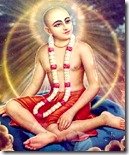 “Shri Chaitanya Mahaprabhu was God Himself according to the indication of the revealed scriptures, but He played the part of a devotee. People who knew Him to be God addressed Him as God, but He used to block His ears with His hands and chant the name of Lord Vishnu. He strongly protested against being called God, although undoubtedly He was God Himself. The Lord behaves so to warn us against unscrupulous men who take pleasure in being addressed as God.” (Shrila Prabhupada, Shrimad Bhagavatam, 1.2.16 Purport)
“Shri Chaitanya Mahaprabhu was God Himself according to the indication of the revealed scriptures, but He played the part of a devotee. People who knew Him to be God addressed Him as God, but He used to block His ears with His hands and chant the name of Lord Vishnu. He strongly protested against being called God, although undoubtedly He was God Himself. The Lord behaves so to warn us against unscrupulous men who take pleasure in being addressed as God.” (Shrila Prabhupada, Shrimad Bhagavatam, 1.2.16 Purport)Circus rolls into town, bringing its many attractions. You have the acrobats, lion-tamers, and entertainers with freakish strength. Then there is the lead clown, the head of the show, who can do things more amazing than anyone else. Now just imagine if such a person were to claim to be God in the flesh. “I am an incarnation of the Supreme Lord. My purpose is such and such. As proof of my divinity watch me do things that are amazing.” The innocent members of society sucked into this racket will be damaged severely, for the recommendations on how to live life handed down by the leaders are what actually count. Every single one of us is God in the sense that we are pure spirit and in minute control over our future fortunes, but since when did being tiny gods equate to being the Supreme Lord Himself? A little show of magic does not one God make, for the breadth and scope of the creation, with its intricacies and innumerable functions carried out at the largest magnitude, remind us that a little advancement in mysticism doesn’t compare to the supreme powers of the greatest mystic, Yogeshvara. Lord Chaitanya Mahaprabhu, an authentic version of God appearing on earth, stood out from the pack of charlatans by never claiming to be God. He utterly refused to be treated as such, for His message was more important than His standing.
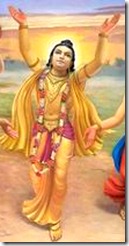 And what was that message? In the Vedic tradition, the Supreme Lord is described by thousands of names, which each reference a specific transcendental activity or feature. The term “God” is too vague to give any pleasure to the worshiper, who is inherently searching after ananda, or bliss. As variety is the mother of enjoyment, the less abstract the vision we have of something, the more enjoyable the potential interaction. The dharma of the spirit soul, which is the essence of identity, is to serve, for this provides the individual the most lasting satisfaction. The service propensity is seen in every type of activity, even those driven by ignorance. If we have a lamp burning inside of the home, even if we put a shade on top, the light emitted is still seen to some degree. With the spirit soul, even the complete inverse of the loving service propensity, anger and rage, at least indicate that the soul’s dharma is present. As light can be reflected in any direction, based on the bodily makeup and the inherent qualities it brings, the living entity can exhibit their service propensity in a variety of ways.
And what was that message? In the Vedic tradition, the Supreme Lord is described by thousands of names, which each reference a specific transcendental activity or feature. The term “God” is too vague to give any pleasure to the worshiper, who is inherently searching after ananda, or bliss. As variety is the mother of enjoyment, the less abstract the vision we have of something, the more enjoyable the potential interaction. The dharma of the spirit soul, which is the essence of identity, is to serve, for this provides the individual the most lasting satisfaction. The service propensity is seen in every type of activity, even those driven by ignorance. If we have a lamp burning inside of the home, even if we put a shade on top, the light emitted is still seen to some degree. With the spirit soul, even the complete inverse of the loving service propensity, anger and rage, at least indicate that the soul’s dharma is present. As light can be reflected in any direction, based on the bodily makeup and the inherent qualities it brings, the living entity can exhibit their service propensity in a variety of ways.Ideal enjoyment comes from interaction. Spiritual life follows the same pattern; it is not meant to create any artificial desire within the living being. Rather, the same propensities that already exist are purified through identifying the proper beneficiary. In a discipline driven by sentiment, dedication to the particular spiritual figure may be present, but unless there is some philosophy attached, the discipline will not be attractive to a large mass of people. Even if many people do claim to follow the identified personality, their allegiance will be in name only, for the majority of the activities followed will be dedicated to someone or something else.
To address these deficiencies, the Vedas provide the highest philosophy on life, as much information as can be consumed by the sober mind. Right away we see that there is a requirement before spiritual understanding can be awakened. The person intoxicated by excessive drinking or the burning rage of the fever of material existence will not have the patience or wherewithal to understand even the first rule of spiritual life, that we are not our bodies. “I am not my body? Then what the heck am I?” The bewildered spirit soul sees differences amongst species based on outward features and resulting behaviors. How can a cow and a pig be the same, for they follow completely different models of action? How is a human being the same as a dog? Moreover, how can the wise human being who is inclined towards piety ever be compared to the low-life who lives perpetually in sin?
“That knowledge by which one undivided spiritual nature is seen in all existences, undivided in the divided, is knowledge in the mode of goodness.” (Lord Krishna, Bhagavad-gita, 18.20)
 Accepting the angle of vision based on intelligence requires sobriety from the start, for without a clear head, how can we understand anything? Can we perform well on exams if we are tired or focused on something completely different? Can we operate a motor vehicle well while intoxicated? These are areas where the need for sobriety is readily acknowledged, but somehow with spiritual life the requirement that one be free of anxieties and attachments borne of bodily relations is a little difficult to accept. The reward for avoiding the most harmful sinful activities, such as intoxication and meat eating, is that one can study the patterns of behavior of the different species and have a better chance of realizing that all life forms are equal.
Accepting the angle of vision based on intelligence requires sobriety from the start, for without a clear head, how can we understand anything? Can we perform well on exams if we are tired or focused on something completely different? Can we operate a motor vehicle well while intoxicated? These are areas where the need for sobriety is readily acknowledged, but somehow with spiritual life the requirement that one be free of anxieties and attachments borne of bodily relations is a little difficult to accept. The reward for avoiding the most harmful sinful activities, such as intoxication and meat eating, is that one can study the patterns of behavior of the different species and have a better chance of realizing that all life forms are equal.At the heart of the living being is the spirit soul, which is so tiny in size that it is impossible to measure its dimensions. We cannot even directly perceive its presence. The soul can only be noticed by the outward symptoms of a living being. Just the fact that there is a difference between a living being and a dead one underscores the importance of the soul. Death is the exiting of the soul from the body and birth is the entry into a new form. The soul is thereby the essence of life, the spark of action, for every species. If the soul has the same importance in whichever form it occupies, it means that there is no difference from one soul to another.
These cogent facts are revealed in the Vedas, whose most concise and complete treatise is the Bhagavad-gita. One who studies this work, learning it under the verbal or written direction of a spiritual master who understands the meanings to the different verses, will be able to see that all life forms are equal, that spirit has natural tendencies that are acted upon across all body types. From the understanding of spirit, from familiarity with the philosophy of the Vedic teachings, one is better situated to take up devotional service to the Supreme Personality of Godhead.
The abstract picture of God is made clearer through both the study and practice of devotional principles. The preliminary understanding that life forms are equal gives one the vision of Brahman, or the all-pervading light of the Absolute Truth. Knowing Brahman is similar to knowing the sunshine and how it dissipates heat and light everywhere. Through further study the same Brahman is understood to be localized in the form of the Supersoul, which resides in the heart of the living being adjacent to the individual soul, or atma.
Bhagavan paints the whole picture. Bhagavan is the most complete understanding of God, as it is inclusive of both Brahman and the Supersoul. It is not that one spiritual tradition worships a specific God who is different from the God of another tradition. Those who think this way are immature in their understanding of the science of self-realization. Yes, spirituality is a science, for it has law codes that are impossible to violate. Just as when you drop an object from the hand, it will fall to the ground because of the laws of gravity, the laws of spirituality apply to every instance, regardless of whether the particular actors are aware that they are being guided by a higher force.
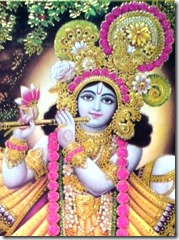 Bhagavan has spiritual attributes, with beauty, knowledge, wealth, strength, fame and renunciation seen to the fullest degree. Since these features are supremely wonderful, Bhagavan is known as Krishna, the all-attractive youth holding a flute in His hands and wearing a peacock feather in His hair. Lord Krishna is the complete representation of Godhead; therefore every other form or expansion comes from Him. The identical forms are referred to as avataras, or those who descend. Even Krishna is sometimes referred to as an avatara, for He comes to earth every now and then from the spiritual world to give people a glimpse of His transcendental features.
Bhagavan has spiritual attributes, with beauty, knowledge, wealth, strength, fame and renunciation seen to the fullest degree. Since these features are supremely wonderful, Bhagavan is known as Krishna, the all-attractive youth holding a flute in His hands and wearing a peacock feather in His hair. Lord Krishna is the complete representation of Godhead; therefore every other form or expansion comes from Him. The identical forms are referred to as avataras, or those who descend. Even Krishna is sometimes referred to as an avatara, for He comes to earth every now and then from the spiritual world to give people a glimpse of His transcendental features.The ability of God to incarnate has created a slight problem in the present age of darkness known as the Kali Yuga. Though the specific incarnations and their features are described in the shastras, or scriptures, still many people in the past thousand years or so have claimed to be incarnations of God. Lord Krishna’s most famous avatara is Lord Rama, the handsome warrior prince of the Treta Yuga who defeated the Rakshasa Ravana in a fight using bows and arrows. In many Vedic traditions just Rama is worshiped along with His wife Sita Devi, younger brother Lakshmana and dedicated and courageous servant Hanuman. Bhagavan is wonderful in this way, as He allows devotees to follow their favored mood of devotion to taste the fruit of existence. It is not that one must worship Krishna and no one else. Bhagavan has different manifestations to provide varieties of transcendental pleasure.
Even the atheists worship God in some way, though their interaction is not direct. With indirect worship come inferior results. The consequence of worshiping matter is that you remain tied to something nonpermanent. If I love my high school so much that I decide I never want to graduate, obviously the decision is not very intelligent. The school has a purpose to fulfill, namely that of providing an education. Once that education is received, the student moves past the class and onto their next venture. If the class is enjoyed so much that one avoids their occupational duties in favor of following their allegiance to something that is constitutionally temporary, they will not be making the best use of their intelligence.
The same principle applies to the largest scale that is the material creation; so any allegiance offered to objects of earth, water, fire, air and ether will bring bitter disappointment in the end, for nothing in the material creation remains manifest forever, not even the sun. The taste relished through such interaction is automatically checked. This also explains why the bogus avataras can never be taken seriously, for their chicanery is exposed through the magic they show which aims to manipulate the material nature in favor of providing temporary enjoyment. The real avataras show people how to worship God perpetually, even into the afterlife. In addition, the transcendental features are not checked in the real incarnations of Godhead. Lord Rama defeated 14,000 attacking Rakshasas all by Himself, and He had a bridge built to Lanka that was made of floating stones. Lord Krishna lifted a massive hill and held it up over His head for seven consecutive days to save the wonderful people of Vrindavana from a massive flood instigated by Lord Indra.
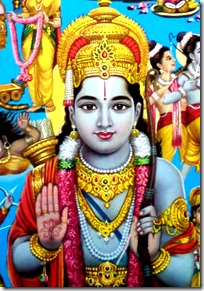 What’s ironic is that even after exhibiting such unmatched feats of strength, Krishna and Rama never openly claimed to be God. People who knew them intimately understood their divine nature, but the Supreme Lord will never pound His chest and demand that others worship Him. The highest interaction possible for any living being is a rasa, or transcendental mellow, which operates on love. For there to be love, the interaction between the participants must be voluntary. Forcing someone to worship God, scaring them with a threat of eternal damnation in a lake of fire or killing them if they don’t show allegiance, doesn’t represent godly activity whatsoever. The material creation exists to house those souls who are not desirous of transcendental association, so there is full freedom in the exercise of activity.
What’s ironic is that even after exhibiting such unmatched feats of strength, Krishna and Rama never openly claimed to be God. People who knew them intimately understood their divine nature, but the Supreme Lord will never pound His chest and demand that others worship Him. The highest interaction possible for any living being is a rasa, or transcendental mellow, which operates on love. For there to be love, the interaction between the participants must be voluntary. Forcing someone to worship God, scaring them with a threat of eternal damnation in a lake of fire or killing them if they don’t show allegiance, doesn’t represent godly activity whatsoever. The material creation exists to house those souls who are not desirous of transcendental association, so there is full freedom in the exercise of activity.Lord Chaitanya was Krishna Himself appearing on earth some five hundred years ago to teach the highest truths of spiritual life in the easiest possible way to understand. In days past, the intelligent class of men sought the shelter of the pristine wilderness, for the surroundings were more conducive to tapasya and yajna, or penance and sacrifice. Through penance one becomes detached from the senses and through sacrifice one remains connected to God. Therefore these two practices were an integral part of the sincere spiritualist’s regimen. In the modern age, however, such practices are almost impossible to adhere to. As evidence of this fact, just try to tell someone that drinking alcohol and eating meat are harmful. They will look at you like you’re crazy. Yet in times past, those who did indulge in these behaviors were considered the strange ones.
Just because sinful behavior is more rampant at any given time doesn’t mean that Krishna’s mercy is somehow made more difficult to acquire. As the circumstances become less favorable for transcendental enlightenment, the Supreme Lord redoubles His efforts towards reclaiming His lost sons and daughters. Lord Chaitanya preached the science of self-realization, the ultimate philosophy of achintya-bhedabheda-tattva, by chanting, “Hare Krishna Hare Krishna, Krishna Krishna, Hare Hare, Hare Rama Hare Rama, Rama Rama, Hare Hare”, openly in public. Krishna and Rama are the holy names, and Hare is the energy of God. “O my dearest Supreme Lord who is known as both Krishna and Rama. O the energy of the Lord. Allow me to be forever engaged in the Lord’s service without any motive for personal sense gratification. Allow me to continually love God without fail.”
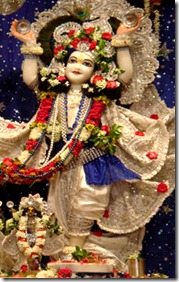 This was the mantra propagated by Lord Chaitanya, who wasn’t met with universal adulation right away. The mantra He revealed was known in the scriptures, but many were hesitant to share it with others so openly. The maha-mantra’s unique message is precisely what makes it so appealing and effective, for it reveals God’s names to everyone in a way that doesn’t violate the rules of spiritual life. With most mantras, expert recitation is required to receive the full benefit. The mantras also aren’t passed on to just anyone. The spiritual master is charged with the safekeeping, holding onto the sound vibrations and waiting to share them with someone who is sincere in their desire to learn about God.
This was the mantra propagated by Lord Chaitanya, who wasn’t met with universal adulation right away. The mantra He revealed was known in the scriptures, but many were hesitant to share it with others so openly. The maha-mantra’s unique message is precisely what makes it so appealing and effective, for it reveals God’s names to everyone in a way that doesn’t violate the rules of spiritual life. With most mantras, expert recitation is required to receive the full benefit. The mantras also aren’t passed on to just anyone. The spiritual master is charged with the safekeeping, holding onto the sound vibrations and waiting to share them with someone who is sincere in their desire to learn about God.Lord Chaitanya became the spiritual master of the world by kindly offering Krishna-prema, or love of God, to anyone who was willing to accept it. Even if they weren’t, they at least got to hear the holy names vibrated through Lord Chaitanya’s chanting or the preaching efforts of His many associates. Intimate friends knew Lord Chaitanya to be Krishna Himself, but whenever anyone who would worship Him in this way, the Lord would cover His ears. He did not like to be called God by anyone, for that was not the purpose of His mission. His behavior stands in stark contrast to the pretender incarnations who show off some mystic ability and then claim to be God in front of as many people as are gullible enough to believe them.
The message broadcast by the spiritual personality is what matters. Even Lord Krishna hid His divine nature from the residents of Vrindavana, who are considered the greatest lovers of God. The dedication to bhakti-yoga, or devotional service, is the desired result, and not a blind allegiance to a particular personality. The shastras tell us who the incarnations are, so we needn’t be puzzled over the issue. Lord Chaitanya was so kind that He didn’t even care if you worshiped Him or not. Worshiping Him, however, is supremely auspicious, because He and His spiritual brother Nityananda Prabhu remove offenses in the chanting of the holy name. They give love for Godhead even if we are unwilling to accept it. Those who regularly hear of the activities of Lord Chaitanya, the dearest son of Shachimata and Jagannatha Mishra, can’t help but be won over by His divine grace. Shri Chaitanya Mahaprabhu is the ocean of mercy, and His transcendental features can only be found in Krishna Himself, who is the reservoir of pleasure.
In Closing:
When addressed as the Supreme Lord ears would He close,
To others divinity not liking to disclose.
Worship Krishna with love was His message,
But addressed Him as God some took the privilege.
Lord Chaitanya was an incarnation that was real,The divine presence in His activities you could feel.
Study the message of preacher, that’s what really counts,
See if guidance removes mind’s pain that steadily mounts.
Remember Nitai-Gaura and have offenses removed,
From resulting love for Krishna their divinity proved.
No comments:
Post a Comment